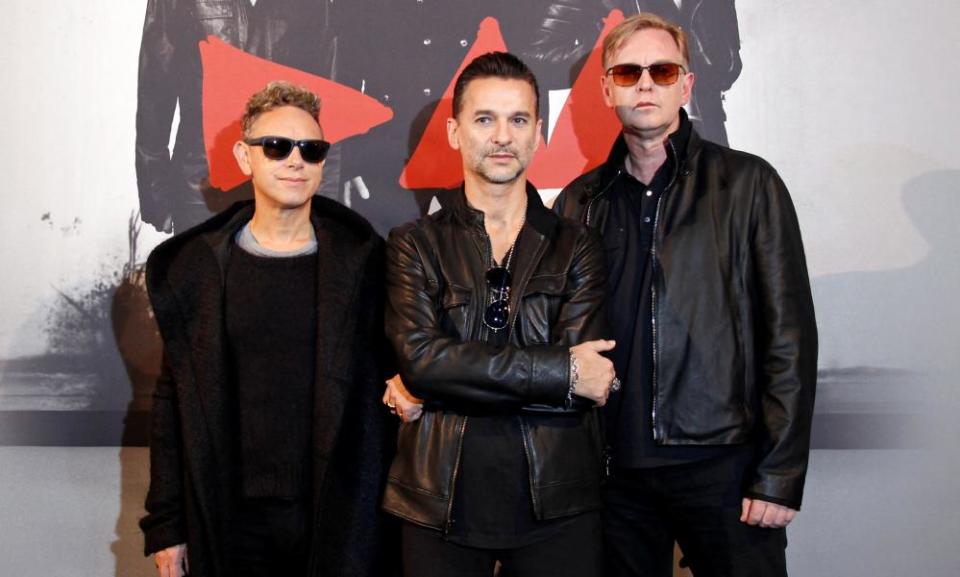Andrew Fletcher: the pop-loving everyman who held Depeche Mode together

Andy Fletcher was the last person to tell you why he was vital to Depeche Mode. In 101, the classic 1989 tour documentary directed by DA Pennebaker and Chris Hegedus, he said: “Martin’s the songwriter, Alan’s the good musician, Dave’s the vocalist, and I bum around.” He knew there was much more to it than that, but the man they all called Fletch felt no need to shout about it.
Depeche Mode are one of the most popular and influential British bands of all time but nothing about them makes sense in conventional terms. It should not be possible to lose your chief songwriter (Vince Clarke) after just one album and then get bigger and better. There was no precedent for a synth-pop group evolving into a stadium rock band without actually playing rock music. It is unusual, if not unique, for one person to write the songs (Martin Gore) and another to sing them (Dave Gahan) with such conviction that it is hard to believe they are not autobiographical. They have sold more than 100m albums and had dozens of hit singles while retaining the outsider allure of a cult band – arguably the world’s largest, with no fewer than three documentaries made about their fandom. And all this from Basildon.

Fletch’s role in Depeche Mode was yet another thing that didn’t follow the rules. He was there from the very beginning, playing bass with Clarke in a punk band called No Romance in China, then co-founding the electronic trio Composition of Sound before Gahan joined and renamed them Depeche Mode. But over the years, fans often wondered what exactly he did. As the truest believer in electronic pop, he was an important sounding board in the studio but he didn’t sing or write songs. He played synthesizers, but not with the virtuosity of his former bandmate Alan Wilder, who quit in 1995. Only once did he admit that doubts about his contribution bothered him. “Because I don’t push myself to the fore, many mistake me for the fifth wheel,” he said in 2013. “Sometimes it’s frustrating not to be taken seriously. After all, you could also say my job is the most important – without me there would be no band any more.”
Fletch’s importance could be hard to grasp because he took on roles that are usually occupied by people outside a band. For a while he was their quasi-manager, handling the business side of what effectively became a small corporation. At various points he owned a restaurant, invested in property and ran his own label, Toast Hawaii. At the same time, he seemed like the childhood friend that pop stars take with them to make sure their feet stay as close to the ground as possible. A natural extrovert, he became the band’s spokesperson and ambassador, with a nice sideline in DJing. (I saw him at a club once: he played a lot of Depeche Mode.) Within the band, he was the diplomat – the glue that held them together.
Anyone who studies pop music knows that bands are mysterious and delicate entities. Some (well, one: the Rolling Stones) have endured for 60 years and others have flamed out after two. It’s hard enough to hold together under pressure when you’re a mid-level indie band, let alone global superstars. What’s required is the right balance of personalities. Fletch was Gore’s best friend (born 15 days apart, they had a joint 50th-birthday party) but he was so amiable and egoless that he could serve as a sturdy bridge to Gahan when things got dicey. A pop star on paper, he came across in the flesh as a profoundly ordinary bloke who liked beer, chess, Chelsea and very dry humour. I’ve never met anyone in a big band who was so utterly unaffected by fame – but then, he would say with relief, he wasn’t actually famous.
That’s not to say Fletch was solid as a rock – he used to drink too much on stage and suffered a breakdown during the making of 1993’s Songs of Faith and Devotion – but in a band that once took a psychiatrist and a drug dealer on the road he was still the level-headed one. There was never any danger of him trying to steal the spotlight or throwing his weight around. He was a facilitator, and proud of it. Once asked if he had a motto for life, he replied: “Sure and steadfast.”
Related: How Depeche Mode (almost) became my own personal Jesus
Fletch was also a great cheerleader for his own band. Fans loved him because he felt like one of us: a man who expressed his joyful enthusiasm for Depeche Mode from the stage rather than the crowd, jigging around behind his keyboard as if he couldn’t believe his luck. It felt as though, if you, too, had experienced the good fortune to grow up with one of the best songwriters of your generation, then that could be you up there. “We had an absolute dream career,” he said in 2017, adding with characteristic understatement: “At least if you take out those years that were a bit messy.”
In 1996, during those “messy” years, Gahan clinically died for two minutes after a drug overdose. Fletch never seemed as if he would be the first member to go. It’s hard to tell what Depeche Mode will do now. Gore and Gahan could continue to record and tour and your ears wouldn’t notice the difference. But Gore has lost his best friend and they have both lost someone who was a constant, steadying presence in the band for 40 years. Only they really know how essential Fletch was and how much he will be missed.

 Yahoo News
Yahoo News 